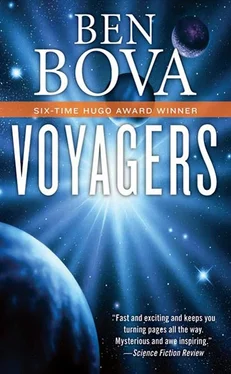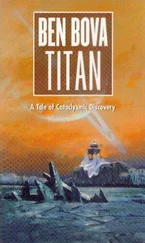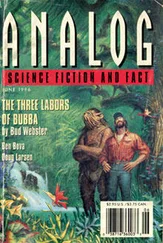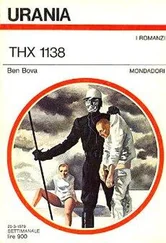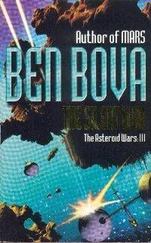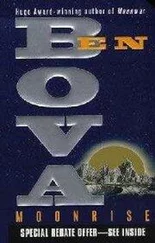Puffing blue clouds of smoke that smelled like burnt pencil shavings, McDermott answered, “You have no idea what’s involved in all this, do you?”
“I’ve found extraterrestrial life, dammit!”
“Phah.” The old man looked completely unimpressed. “Listen to me, sonny. I saved your career. If it weren’t for me you’d be an unemployed ex-astronaut with a useless degree in astrophysics, teaching in some jerkwater college in Texas. Don’t forget that.”
“What does that have to do with it?”
McDermott puffed on his pipe. “Jupiter’s giving off some strange radio pulses, the likes of which we’ve never seen before. So I get the inspiration of bringing an optical astronomer into the observatory, somebody who can get us access to the first pictures Big Eye is taking, from orbit.”
“Okay, it was a good idea. A great idea.”
“You bet it was.”
“And it paid off,” Stoner went on, “with the biggest discovery in history.”
The old man snorted. “And you want to run down to Washington and tell your old buddies in NASA about it.”
“For a start.”
“And become a big hero. Publish a paper in Icarus . Get your picture on the cover of Time magazine. Become another goddamned Sagan and get on the Johnny Carson show.”
“What’s wrong with you?” Stoner asked. The man was talking in riddles.
McDermott blew a jet of smoke toward the ceiling. “What have you discovered, Stoner? What do those Big Eye photographs really show?”
“A spacecraft orbiting Jupiter, for Chrissake!”
“Bullcrap!” the old man bellowed. “It’s a natural satellite. Another moon. The damned planet’s got fifteen of ’em that we know about. This makes sixteen.”
“With the kind of UV-to-blue indices we’ve measured?” Stoner countered. “It’s much too bright to be a natural moon.”
“How the hell do you know? It could be a chunk of ice that’s been captured…”
“It’s metal,” Stoner said, quietly, firmly.
McDermott took the pipe from his teeth and shook his head sorrowfully. “You’re grasping at straws, sonny. All you’ve got is a couple of photographs that show a tiny speck of light nobody’s noticed before.”
“Big Eye picked it up because it’s too faint for telescopes on the ground to see.”
“So why should you think it’s artificial?”
Eagerly hunching forward in his little chair, Stoner ticked off points on his fingers. “First, your people pick up these radio pulses—something brand new. Nothing like them have ever come from Jupiter before.”
“That we know of.”
“Second, you bring me into the game so you can acquire the use of Big Eye before it’s officially turned over to the universities. I get them to look at Jupiter and we find…something new.”
“A sixteenth moon,” McDermott muttered.
“Too much of a coincidence,” Stoner insisted. “The new radio signals and the new…object. It’s extraterrestrial life. Intelligent extraterrestrial life.”
“No.”
“Yes! Face it!”
Big Mac sucked on his pipe. It had gone out. Fumbling in his pockets for his lighter, he said, “Listen to me. Even if you’re right it’s too early to go running around yelling about it. It’s a million-to-one shot, and if you’re wrong about it, you’d be ruining yourself and the observatory by blabbing about it now.”
“But other facilities must be picking up the radio pulses. We can’t sit here and let them take the credit for discovering them.”
“They don’t have the Big Eye photographs,” McDermott said. “That’s our ace in the hole.”
“For how long?”
“Long enough. That’s why I got the Navy to classify everything.”
Stoner got to his feet and paced the length of the bedroom. “We’ve got the greatest discovery in the history of science…”
“Maybe.”
“…and you want to keep it a secret.”
McDermott gave a grunt that might have been a chuckle and, heaving himself up from the bed, jabbed the pipe stem-first toward Stoner. “It’s out of our hands anyway, sonny. Come with me. Come on.”
They went out the unlocked bedroom door, along the upstairs hallway of the old house and down the steep narrow stairs to the spacious new living room that bordered on the indoor pool.
Someone was swimming, methodically plodding his way slowly along its length in an overhand crawl stroke. Stoner couldn’t be sure, but he thought the swimmer was Dooley.
Then he noticed that two men were sitting in the living room, in front of the empty dark fireplace. They got to their feet as Stoner and McDermott approached. Stoner recognized one of them as Jeff Thompson, from the observatory.
“Jeff,” he said as he came toward the fireplace. “So they dragged you in, too.”
“Not exactly,” Thompson said, smiling a little guiltily. “I came voluntarily.”
“Everybody’s volunteered to keep this thing quiet,” McDermott rumbled from behind Stoner. “You’re the only one who’s giving us trouble.”
I’m the only one who’s not on your direct payroll, Stoner answered silently.
The other man stuck out his hand to Stoner. “Hi. I’m Fred Tuttle.”
McDermott explained, “Lieutenant Commander Tuttle is our contracting officer in the Office of Naval Research.”
Tuttle was in civvies: a neat tan corduroy suit with brown suede patches on the elbows. He was a small man, with the round freckled face of a Mark Twain character. But his grip was strong in Stoner’s hand, self-assured. A salesman’s grip, with the winning smile that they teach you in confidence courses.
“You’re Air Force, aren’t you?” the lieutenant commander asked.
“Inactive reserve,” Stoner replied. “ Very inactive reserve.”
Tuttle’s smile widened, showing even white teeth. “Well, we may be forced to put you back on active status, you know.”
“No, I don’t know. I don’t understand what in hell is going on.”
With a gesture Tuttle got them all seated. Stoner took the sofa that flanked the cold fireplace. It smelled of carbon and wet leaves. Thompson sat next to him. McDermott grabbed the big cushioned chair opposite. Tuttle remained standing, in charge.
“What we’ve got here”—the lieutenant commander’s face went serious—“is something that may be vitally important to the nation’s security.”
“Important to the nation’s security?” Stoner echoed, incredulous. “How can ETI be…?”
“ETI?” Tuttle asked.
“Extraterrestrial intelligence,” Thompson explained. “Astronomical jargon.”
“Let’s not get carried away here,” McDermott rumbled. “All we’ve really got is these anomalous low-frequency radio signals and a few photographs showing what’s most likely a sixteenth moon of Jupiter.”
“Even if that’s all there is to it,” Stoner countered, icily, “we should publish the information. In Science . Or Nature . Before somebody else scoops us.”
The old man glowered from behind his pipe. Tuttle clasped his hands behind his back and stared at his shoe tops.
Stoner felt the glacial calm that always descended upon him when he grew angry. Very quietly he asked, “What in hell happened to freedom of speech around here? Whatever happened to Faraday’s dictum: ‘Physics is to make experiments and to publish them ’?”
“I’m not going to put my reputation on the line for some radio pulses and a couple of photos!” McDermott blurted. “I’m not going to make a jackass of myself claiming that we’ve discovered ETI and then be forced to retract it all when it turns out to be completely natural.”
“Then publish what we’ve got,” Stoner said in a cobra’s whisper. “Forget the ETI conclusion, but at least let Jeff publish the radio pulses. He deserves that much. Get the priority. In print.”
Читать дальше
